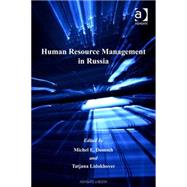- ISBN: 9780754648765 | 0754648761
- Cover: Hardcover
- Copyright: 3/30/2007
'Here in the West, our knowledge and understanding of HR policies and practices in Russia is scant and often in caricature. The present work seeks to fill the gap; precise, in-depth descriptions coupled with academic rigour provide us with much needed food for reflection." Professor Hector Ormando, Ecole de Management de Lyon, France "The book explores a full array of HRM facets in Russia in an academically sound and business-relevant way. I believe it will be an invaluable resource for students of international management and HR executives in MNCs." Dr Michael Dickmann, Cranfield School of Management, UK Despite the widespread and large-scale changes in Russian business, to date little serious attention has been paid to the nature and development of the Human Resource function. This book redresses this gap by providing a detailed introduction into the current economic developments taking place in Russia, alongside a full length examination of the new role of the HR department in Russian enterprises, and the influence of national politics on HR practice. Investigating Human Resource Management issues in Russia, this book looks at the current state of Human Resource practice within Russian enterprises; its various problems and possible solutions. Following a detialed introduction into the current economic developments taking place in Russia, the book examines the new role of the HR department in Russian enterprises, and the influence of national politics on HR practice. The book also discusses key HRM issues such as recruitment and selection, training and development, payment and compensation, before surveying the various HR problems encountered by multinational companies working in Russia. Contents: Preface; Introduction: The Broader Historical, Social and Economic Context of the Current Situation in Russia, Michel E. Domsch and Tatjana Lidokhover. General HRM issues: One Step Forward, Two Steps Back: Negative Consequences of National Policy on Human Resource Management Practices in Russia, Ruth C. May and Donna E. Ledgerwood; Leadership development in Russia, Stanislav Shekshnia, Daniel McCarthy and Sheila M. Puffer; Control and alienation in Russian enterprises, Moshe Banai and William D. Reisel; Trust and organizational culture, Tatiana Kovaleva; HRM practices in virtual companies in Russia, Sofia Kosheleva and Marina Libo; Human Resource Management at a steel giant in Russia, Vera Trappmann. Key HRM Issues: Recruitment at Russian enterprises, Valery Yakubovich and Irina Kozina; Tendencies of the Russian labour and recruitment markets employment in a medium-sized IT company, Henrik Loos; Training and development of personnel in Russian companies, Tatiana Soltitskaya and Tatiana Andreeva; Professional training and retraining: challenges of transition (the case of the shipbuilding industry in St. Petersburg, Russia), Lubov Ejova and Irina Olimpieva; Pay in Russia, Graham Hollinshead. HRM Practices in Multinational Companies: Western-Russian acquisition negotiations and post-acquisition integration: a case study, Kenneth Husted and Snejina Michailova; Hospitable or hostile? Knowledge transfers into the Russian host environment, Adam Smale and Vesa Suutari; Human Resource Management practices in Russia and Canada: convergence or divergence?, Sudhir K. Saha; The effect of Human Resource Management practices on MNC subsidiary performance in Russia, Carl F. Fey and Ingmar Bjorkman. Index. About the Author: Prof Dr Michel E. Domsch - Professor of Management and Head of the Institute for Human Resource Management and International Management at Helmut-Schmidt-University in Hamburg, Germany. Tatjana Lidokhover is a Research Assistant at the Institute for Human Resource and International Management at Helmut-Schmidt-University in Hamburg, Germany.






